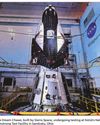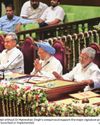
Artificial intelligence often gets criticised because it makes up information that appears to be factual, known as hallucinations. The plausible fakes have roiled not only chatbot sessions but lawsuits and medical records. For a time last year, a patently false claim from a new Google chatbot helped drive down the company's market value by an estimated $100 billion. In the universe of science, however, innovators are finding that AI hallucinations can be remarkably useful. The smart machines, it turns out, are dreaming up riots of unrealities that help scientists track cancer, design drugs, invent medical devices, uncover weather phenomena and even win the Nobel Prize.
"The public thinks it's all bad," said Amy McGovern, a computer scientist who directs a federal AI institute. "But it's actually giving scientists new ideas. It's giving them the chance to explore ideas they might not have thought about otherwise." Now, AI hallucinations are reinvigorating the creative side of science. They speed the process by which scientists and inventors dream up new ideas and test them to see if reality concurs. It's the scientific method - only supercharged.
"We're exploring," said James J Collins, an MIT professor who recently praised hallucinations for speeding his research into novel antibiotics. "We're asking the models to come up with completely new molecules."
Producing a minuscule system for drug deliveries
The AI hallucinations arise when scientists teach generative computer models about a particular subject and then let the machines rework that information. The results can range from subtle and wrongheaded to surreal. At times, they lead to major discoveries.
This story is from the December 29, 2024 edition of Financial Express Mumbai.
Start your 7-day Magzter GOLD free trial to access thousands of curated premium stories, and 9,000+ magazines and newspapers.
Already a subscriber ? Sign In
This story is from the December 29, 2024 edition of Financial Express Mumbai.
Start your 7-day Magzter GOLD free trial to access thousands of curated premium stories, and 9,000+ magazines and newspapers.
Already a subscriber? Sign In

Microsoft to spend $80 billion on AI data centers this year
MICROSOFT CORP PLANS to spend $80 billion this fiscal year building out data centers, underscoring the intense capital requirements of artificial intelligence.

S Korea investigators ask acting prez to clear way for Yoon's arrest
SOUTH KOREAN INVESTIGATORS again asked the country's acting president on Saturday to order the presidential security service to comply with an arrest warrant for impeached President Yoon Suk Yeol.

Chinese Dam on Table for Sullivan's India Visit
AI, civilian nuclear cooperation, space may also be taken up

Mike Johnson Re-elected US House Speaker
Republican Congressman Mike Johnson on Friday was re-elected as Speaker of the US House of Representatives with a narrow victory margin of three votes.

No jail time for Trump, suggests judge in US hush money case
Will keep fighting, says communications director Cheung

Border-Gavaskar Trophy: As Bumrah leaves, 'captain' Kohli calls the shots
Kohli took charge after Bumrah left bowling due to spasm

Rohit clears the air: Not going anywhere
Says those on outside can't influence when he stops playing

Worrying signs from the Arctic
Scientists say fires in the region could have major consequences

Big rockets, a telescope & big changes in space await in 2025
Some key events to look forward to in space & astronomy

Dr Manmohan Singh, RIP
The present generation (born after 1991) scarcely believes that there was an India with one television channel, one car, one airline, one telephone service provider, trunk calls, PCO/STD/ISD booths and long waiting lists for everything from two-wheelers to train tickets to passports. The seeds of change were sowed by Dr Singh, a fact belatedly acknowledged by Prime Minister Modi's tribute to him and the Cabinet resolution.